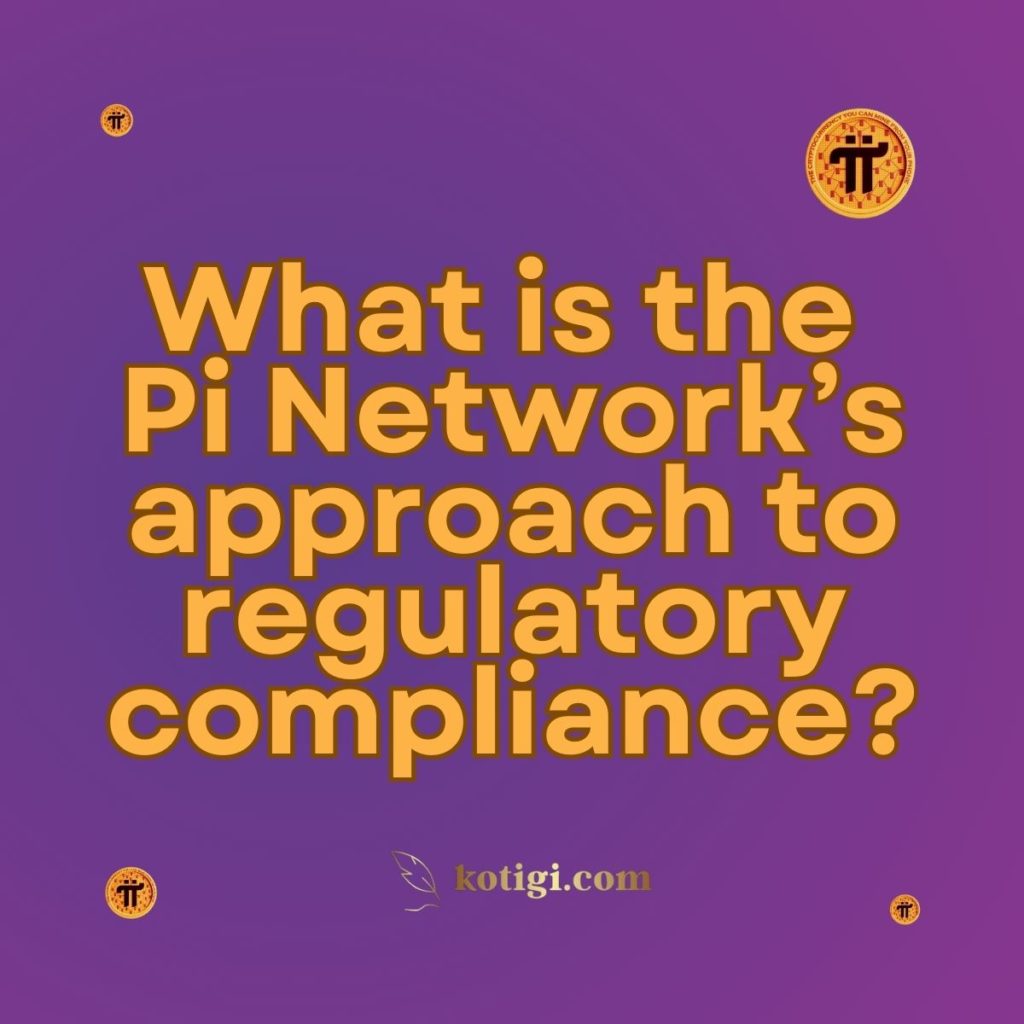
What is the Pi Network’s approach to regulatory compliance?
Pi Network’s approach to regulatory compliance focuses on aligning with global financial standards, ensuring legal operations through KYC procedures, and working with regulatory authorities to stay compliant with local laws. The network prioritizes transparency, user verification, and collaboration with relevant agencies to create a secure, legally sound ecosystem.
Introduction
Regulatory compliance is a crucial factor for any cryptocurrency aiming for long-term success and mass adoption, and Pi Network is no exception. As a decentralized platform with millions of users globally, Pi must ensure that it adheres to financial regulations, maintains transparency, and protects users’ privacy. In this post, we will explore Pi Network’s comprehensive approach to regulatory compliance, its collaboration with authorities, and the steps taken to ensure that it remains a legally compliant and secure platform for its users.
1. Adherence to Global Financial Standards
Pi Network understands the importance of operating within global financial standards to avoid regulatory issues and gain trust among users, governments, and businesses.
1.1 AML and CFT Compliance
Anti-Money Laundering (AML) and Countering the Financing of Terrorism (CFT) regulations are central to Pi Network’s compliance strategy. By adhering to these global standards, Pi ensures that its platform is not misused for illicit activities, making it more secure for legitimate users.
1.2 Data Privacy and Security
Complying with data privacy regulations like the General Data Protection Regulation (GDPR) is another critical aspect of Pi’s approach. Pi Network aims to protect users’ personal information while ensuring transparency in how data is managed and stored.
1.3 International Financial Regulations
Pi Network continuously monitors international financial regulations to ensure that its operations align with evolving legal frameworks. This proactive approach helps the platform remain compliant across various jurisdictions.
2. KYC Verification Process
Know Your Customer (KYC) is a core element of Pi Network’s regulatory compliance efforts, ensuring that users are verified before engaging in transactions.
2.1 User Identification
Pi Network has implemented a comprehensive KYC process to verify the identity of its users. This process is vital in preventing fraud and ensuring that the network remains a secure and trustworthy environment.
2.2 Preventing Fraudulent Activities
By requiring KYC verification, Pi Network aims to reduce the risk of fraudulent activities such as identity theft, money laundering, and scams. This verification step helps protect both users and the integrity of the platform.
2.3 Role in Legal Compliance
KYC compliance is crucial for Pi Network’s alignment with legal requirements, particularly in regions with stringent regulatory oversight. It ensures that the platform can operate within the law and avoid penalties.
3. Collaborations with Regulatory Authorities
Pi Network’s proactive approach to regulatory compliance includes forming partnerships and collaborations with governmental and financial regulatory bodies.
3.1 Engagement with Financial Regulators
Pi Network engages with financial regulators in various countries to ensure that its operations are in line with local laws. These collaborations are critical for obtaining the necessary licenses and approvals to operate legally.
3.2 Cross-Border Compliance
Given Pi’s global user base, it is essential for the network to comply with cross-border financial regulations. Pi Network works closely with regulatory bodies in different countries to ensure that it meets the requirements for international transactions.
3.3 Future Regulatory Adaptations
As financial regulations evolve, Pi Network remains committed to adapting to new rules and standards. Its ongoing dialogue with regulatory bodies allows Pi to stay ahead of regulatory changes and remain compliant.
4. Legal Framework and Licensing
Operating within a clear legal framework is essential for any cryptocurrency. Pi Network has developed a robust legal structure to ensure its long-term viability.
4.1 Legal Counsel and Advisors
Pi Network works with legal experts to navigate the complex regulatory landscape of cryptocurrencies. These advisors help ensure that Pi complies with relevant laws, reducing the risk of legal disputes.
4.2 Licenses and Approvals
To ensure its operations are legally sound, Pi Network pursues the necessary licenses in different jurisdictions. These licenses are vital for enabling transactions, partnerships, and the use of Pi coins in various markets.
4.3 Intellectual Property Protection
Pi Network also focuses on protecting its intellectual property, ensuring that its technology and brand are legally safeguarded. This protection is important for maintaining a competitive edge in the market.
5. Transparency and Reporting
Transparency is key to building trust with users and regulators. Pi Network takes several steps to ensure that its operations are open and transparent.
5.1 Regular Audits and Reporting
To demonstrate its commitment to transparency, Pi Network undergoes regular financial and operational audits. These audits ensure that the platform is operating within legal and regulatory boundaries.
5.2 Financial Disclosures
Pi Network provides financial disclosures to both users and regulatory bodies, ensuring that all stakeholders have a clear understanding of the platform’s operations. This helps build trust and credibility within the ecosystem.
5.3 Transparent User Policies
Pi Network’s terms of service, privacy policies, and other legal documents are clearly communicated to users. This transparency helps users understand their rights and obligations while using the platform.
6. Future of Pi Network’s Compliance Strategy
As Pi Network grows, its approach to regulatory compliance will need to evolve. The network is committed to adapting its strategies to meet new challenges and legal requirements.
6.1 Preparing for Future Regulations
Pi Network is proactive in preparing for future regulations that could impact the cryptocurrency industry. By staying ahead of regulatory trends, Pi can ensure that its platform remains compliant in the long term.
6.2 Expanding Regulatory Partnerships
Pi Network aims to expand its partnerships with regulatory bodies to cover more regions and ensure full compliance as the platform scales. These partnerships will be crucial for Pi’s continued growth.
6.3 Continuous Monitoring and Adaptation
Pi Network is committed to continuous monitoring of global regulatory changes and will adapt its compliance strategies accordingly. This ensures that the platform remains legally sound as new regulations emerge.
Conclusion
Pi Network’s approach to regulatory compliance is comprehensive, focusing on adhering to global financial standards, implementing robust KYC processes, and working closely with regulatory bodies. By maintaining transparency, securing necessary licenses, and staying ahead of evolving regulations, Pi ensures that its platform remains secure, legal, and trustworthy for its users. As the network continues to grow, its commitment to regulatory compliance will be key to its long-term success.
Key Takeaways
- Pi Network adheres to global financial standards, including AML, CFT, and data privacy regulations.
- A robust KYC process ensures user verification, reduces fraud, and aligns with regulatory requirements.
- Collaborations with financial regulators enable Pi Network to operate legally across multiple jurisdictions.
- Pi Network pursues necessary licenses and works with legal advisors to ensure its operations are legally sound.
- Transparency through regular audits, financial disclosures, and clear user policies is a core aspect of Pi’s compliance approach.
- Pi Network is prepared to adapt to future regulations and is committed to continuous monitoring of the evolving regulatory landscape.





